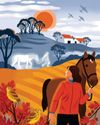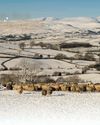American INVADERS!
July 2024
|BBC Countryfile Magazine
Escaping from fur factories in the 1950s, mink flourished in the countryside and began devastating native species. Now conservationists in East Anglia are finally turning the tide on the...

Two years ago, Tony Martin was sent a photo by one of the volunteers at the charity he chairs, the Waterlife Recovery Trust (WRT). "It was a cracker," Tony says over Zoom from his home in Cambridgeshire.
"It's a juvenile mink with balls for brains, and he's grabbing the neck of an adult heron." A male mink typically measures less than 65cm long, including tail, and weighs 1-1.5kg- quite a lot smaller than an otter and bigger than a stoat.
A heron stands up to one-metre tall and has a long, dagger-like beak.
"Apparently," Tony adds with a certain amount of relish, "both survived the encounter." Tony's admiration for this small but undoubtedly fierce mustelid is almost unquenchable, so it seems strange that he should be the leading player in the first sustained and comprehensive attempt to eradicate the species from Great Britain.
 Tony and colleagues and volunteers from the trust have so far entirely cleared Norfolk, Suffolk, East Cambridgeshire and parts of Lincolnshire of mink, almost 10% of the land area of England. It is already the largest pest-mammal eradication project ever attempted, and should the campaign succeed in making England, Scotland and Wales entirely mink-free, it would dwarf any other project in almost unfathomable proportions.
Tony and colleagues and volunteers from the trust have so far entirely cleared Norfolk, Suffolk, East Cambridgeshire and parts of Lincolnshire of mink, almost 10% of the land area of England. It is already the largest pest-mammal eradication project ever attempted, and should the campaign succeed in making England, Scotland and Wales entirely mink-free, it would dwarf any other project in almost unfathomable proportions.In a previous life, Tony Martin was the driving force behind eliminating non-native rats and mice from the sub-Antarctic island of South Georgia, 3,500km² of admittedly rugged, mountainous terrain. East Anglia alone is 12,500km².

هذه القصة من طبعة July 2024 من BBC Countryfile Magazine.
اشترك في Magzter GOLD للوصول إلى آلاف القصص المتميزة المنسقة، وأكثر من 9000 مجلة وصحيفة.
هل أنت مشترك بالفعل؟ تسجيل الدخول
المزيد من القصص من BBC Countryfile Magazine

BBC Countryfile Magazine
Manors and meadows
This December marks 250 years since Jane Austen's birth. To celebrate, Jack Watkins ambles around Chawton, where the writer penned novels that changed fiction forever
7 mins
December 2025

BBC Countryfile Magazine
TOP 10 ROYAL RESIDENCES
Castles, palaces and stately homes open a window into the history and private lives of the British monarchy
9 mins
December 2025

BBC Countryfile Magazine
Your countryside
HAVE YOUR SAY ON RURAL ISSUES
1 mins
December 2025

BBC Countryfile Magazine
Community spirit
Rural pubs across Britain are closing at an alarming rate - but local people are fighting back to save inns that have been at the hearts of their villages for centuries. Vivienne Crow orders a pint
4 mins
December 2025

BBC Countryfile Magazine
Gift ideas for nature lovers
Find inspirational and thoughtful presents for all the family in our pick of top outdoor gear and a round-up of this year's best nature and wildlife books
2 mins
December 2025

BBC Countryfile Magazine
Toad numbers are in freefall.It's in our power to save them
After becoming engaged at Christmas in 1998, my new fiancé and I were confronted by an enormous toad on the way to meet the vicar.
2 mins
December 2025

BBC Countryfile Magazine
Conquer fell running
Infamously tough yet famously friendly, the sport of fell running will take your fitness to new heights amid the wildest landscapes. Here's our beginners' guide
3 mins
December 2025

BBC Countryfile Magazine
A glorious haunting
They lived in the same village and shared the same dreams – just 60 years apart.
6 mins
December 2025

BBC Countryfile Magazine
The big questions answered
Across the UK, but particularly in the southeast of England, giant and featureless buildings are springing up.
13 mins
December 2025

BBC Countryfile Magazine
Away in a manger
While most of us down tools and pick up the mince pies, a farmer's work doesn't stop for the festive break.
5 mins
December 2025
Listen
Translate
Change font size

